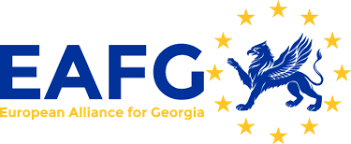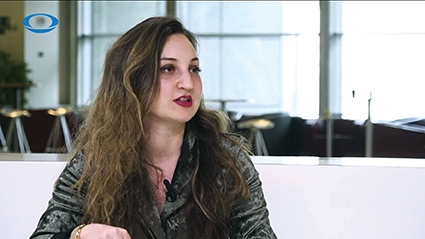Balkan Lessons for Georgia
Exclusive Interview
For the first time in history, the European Commission has a Georgian citizen among its ranks of decision-makers: Policy Officer Teona Lavrelashvili, 28, who oversees the aspects of strategic communication between the Western Balkans and Turkey. The road to the European Commission was not an easy one to tread; as any of its employees can attest, it requires quite some effort, with willpower, outstanding knowledge of the field and ability to work tirelessly all necessary ingredients. Commission activities aside, Teona is also a founding member of the European Alliance for Georgia, a Brussels-based advocacy organization aiming to promote Georgia in Europe.
And while working on Georgian issues in the Commission would be a conflict of interest, she has nabbed the next best deal: that of Balkans enlargement. The importance of the Balkan experience in Georgia’s own quest to become an EU member cannot be understated, something Ms Lavrelashvili well attested to in an interview for our “Messages from Brussels” series.
How close are the Balkan states to the EU membership? To what extent one can say that it’s a matter of the immediate future?
The European Commission has just created a new strategy concerning the enlargement of the Western Balkans and mentioning Serbia and Montenegro as front-runners in the region, set to join the Union by 2025. It’s no guarantee; it will be based on the progress made by these countries; the next country on the list is Bosnia and Herzegovina with which the EU has launched procedures.
To what extent are the Balkan states in the EU?
At this stage, some EU members are not ready to see the EU enlarged. There are skeptical countries, the population of which is not convinced whether they want to see the Balkans in the EU. That’s why it will be very important for Georgia to carry out measures so that the information about Georgia is adequate and positive.
What can Georgia learn from the experience of the Balkans and from what they will do?
This experience is of crucial importance to us and it’s necessary to learn from it. I have just been to Serbia, with whom Georgia recently signed a bilateral visa free travel agreement. Such external tools helping the Western Balkan countries in the integration process should be examined. Those tools don’t involve only enlargement or negotiating chapter points, but also an intergovernmental foundation, namely the Western Balkan Foundation, which assists those countries to approach the EU under different formats. It was created by EU member state governments which support the membership of the Western Balkan countries in the EU. It would be very interesting to create a similar foundation in relation to Georgia but it’s important to realize that it should be a foundation created through the regional efforts of Georgia, Ukraine and Moldova. I think this idea of GUM (Georgia, Ukraine and Moldova) is becoming more and more popular not only in Georgia but also in Ukraine and Moldova.
If this foundation is created, which governments should we expect to invest effort in it?
That depends on the negotiation process. It’s an idea and initiative on the governmental level, to be discussed within diplomatic circles. There is a high level Georgia-EU cooperation format which implies annual meetings between the President of the European Commission and the Georgian leadership. A foundation could be the next step. The idea should be clear that Georgia needs new, innovative ways to accelerate its integration.
One of the similarities between Georgia and the Balkans is how powerful the Church is. Foreign dignitaries often visit the Patriarch while in Georgia. What is the situation in Serbia and Montenegro?
Serbia, like Montenegro, sees the Orthodox Church playing an important role. The majority of the population is religious. But the Serbian Orthodox Church has yet to express its official opinion on EU integration, to do with the Kosovo issue. If the EU recognizes Kosovo, the Church will play a very negative role and will not support the EU’s request to recognize Kosovo.
How does the argument of sharing the same faith with Russia work in Serbia?
The narrative about Russia works in Serbia, connected with the past and the brotherhood between these countries, including in terms of the Kosovo issue. But the majority of the population supports joining the EU, though when it comes to the question as to which invests most in Serbia, the answer is Russia and not the EU.
Kosovo, Russia, and the Kremlin narrative always refers to the fact that if Serbia joins the EU, its government will be requested to recognize Kosovo. To what extent is this scenario feasible?
That’s not true. It’s not about the recognition. It’s about normalizing the Pristina-Belgrad relationship and recognizing the independence of Kosovo is not a condition. Some members of the EU did not recognize Kosovo as an independent state.
To what extent could it be an obstacle for Kosovo in terms of EU membership, seeing as Serbia has a right to veto?
At this stage, it’s early to speak about this. There is no well-defined answer. There’s a discussion in the EU and EU institutes as to how to carry out institutional changes so that countries don’t veto each other. So, in October, we should expect new ideas concerning the internal institutional structure.
The Eurosceptically-inclined part of Georgian society often alludes to the West using double standards in relation to Georgia and they often question Montenegro becoming a NATO member
We should take into account the fact that geography plays an important role. If Georgia were in the Western Balkans, we would be an EU member. The fact that Georgia is a geographical neighbor of Russia means it is regarded as a part of the South Caucasian security complex; that’s why it’s important that Georgia learns a lesson from this experience and considers GUM, with Georgia, Ukraine and Moldova as one region and its aspiration to NATO and EU regarded as coming from one region.
This article was prepared in the scope of “Messages from Brussels” series, a project by European Alliance for Georgia, a Brussels-based advocacy organization dedicated to “Bringing more Georgia into Europe.”

by Vazha Tavberidze












